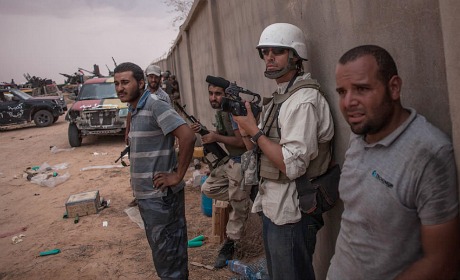I’m conflicted about Brian Oakes‘ Jim: The James Foley Story, which I saw earlier today at the Park City Library. Foley was the freelance American journalist who was covering the Syrian conflict when he was captured by ISIS on 11.22.12 and then decapitated — which was posted on video — by the late “Jihadi John” (i.e., Muhammad Jassim Abdulkarim Olayan al-Dhafiri) on 8.19.14. Oakes is a New Hampshire-based filmmaker who was Foley’s childhood friend and had the family’s cooperation, etc. And that’s a problem, I’m afraid.

As you might expect, the doc is worshipful — Foley was a great fellow, a ballsy adventurer, clever, resourceful, generous of heart. I’m sorry to say this but two hours of adoration can wear you down a bit. Was there anything about Foley that was lacking or imperfect? Most likely but the doc won’t go there. It would have been more interesting to know a little more.
Foley’s story is passed along by family (parents, two or three brothers, a sister, friends and fellow journalists). Foley was imprisoned for nearly two years by ISIS before he was killed, and as much as I hate to say this the film loses vitality and feels claustrophobic when this awful period of captivity is described by Foley’s former journalist cellmates.
There are numerous facts and reports on Foley’s Wikipedia page that the doc ignores. (Or that I missed.) The doc, for example, isn’t very forthcoming about the some of the particulars behind the efforts by Foley’s family to negotiate Jim’s release. ISIS wanted 100 million euros, but it’s been reported that the Foleys had been threatened with prosecution by the U.S. government if they paid. It’s also understood that U.S. authorities were more hard-nosed than reps for France and Italy, who played ball and managed to free journalists of their own. In July 2014 President Obama authorized a “substantial and complex” rescue operation after spooks said a “broad collection of intelligence” led to a belief that Foley and other hostages were being held at a specific location in Syria. But the mission failed because the hostages had been moved.
It feels somehow wrong or unkind to say that Jim doesn’t cut it, but if it had been more factual and neutral and less beholden to the experience and feelings of those who loved him, it would have been a better film.

